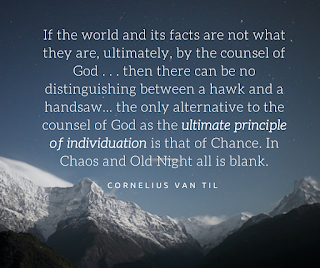Daniel Akande's Blog, page 3
October 16, 2023
The Battle of Presuppositions
OBJECTION: "Logic, uniformity of nature, causation, a mind-independent reality, reliability of sense perception, etc are merely presuppositions of my worldview. They are properly basic and do not need to be justified. We both presuppose them so why do you need to add an extra entity (i.e. God)?"
This kind of objection is encountered rather frequently and is used by unbelievers who have been faced with the insurmountable difficulty of answering the presuppositionalist's questions about these thing...
August 15, 2022
The Exclusive Nature of Christian Theism
As human beings, we are wired to think in generalities. To know particular things, we usually place them in broader, more general contexts. We try and see the qualities a thing shares with other things, and through a process of abstraction, we create classes and general categories. Abstraction is an integral part of human thought. So it is no surprise that when it comes to the question of the existence of God, philosophers have applied the process of abstraction.
Van Til taught that abstract reas...
August 4, 2022
The Authorial Analogy & The Problem of Evil
One of the most important philosophical and theological questions we can ask is about God’s relation to the world. There are various ways to think of God’s relation to the world, and the way we prefer would have an impact on our view of God. The Bible itself is fond of the use of analogies to help us understand God’s relation to the world. So there is biblical warrant for the use of analogies. The analogy I think is the best is the authorial analogy. The authorial analogy frames God’s relation t...
July 24, 2022
July 1, 2022
June 30, 2022
A Simple Argument for God's Existence
This argument can begin with any object that exists. Think of anything. Let's say.. A red cup.
Now, this cup has qualities it shares with other objects. This means that it is related to many other objects. Its redness, for example, relates it to other red things. And its "cup-ness" (the qualities that make it a cup) relates it to other cups.
This is true for any object we come across in our experience. If there was an object that had nothing in common with other objects, we wouldn't even be able t...
February 26, 2022
Revelational Epistemology: A Brief Sketch
Revelational Epistemology: A Brief Sketch
I will begin by quoting a passage from Cornelius Van Til’s A Survey of Christian Epistemology:
According to Scripture, God has created the “universe.” God has created time and space. God has created all the “facts” of science. God has created the human mind. In this human mind God has laid the laws of thought according to which it is to operate. In the facts of science God has laid the laws of being according to which they function. In other words, the im...
January 15, 2022
A Dilemma for Unitarianism
This is an excerpt from a project I’m currently working on. I thought I’d post it here.
We begin our investigation of non-Christian forms of theisms with the most popular variety—Unitarianism. Unitarianism posits that God is wholly one. That is, there is no essential diversity within God. Contrary to Trinitarianism which posits that God is both one and three, Unitarianism maintains an absolute divine unity. Unitarianism, as a form of theism, also maintains that God is personal. The Unitarian woul...
January 5, 2022
Contemporary Philosophy of Religion and the Myth of Neutrality
It has been something of a recent trend in contemporary philosophy of religion to appeal to considerations of theoretical virtue and Bayesian probability theory in order to adjudicate between competing worldviews. This move has been championed mostly by Graham Oppy, considered by many to be the best defender of atheism alive, however many more atheist and theist philosophers have adopted this approach. What I aim to show in this brief article is that the method proposed by thinkers such as Oppy ...
December 19, 2021
God and the Problem of Individuation

The transcendental argument for Christian theism, as conceived by Cornelius Van Til, aims to demonstrate the necessity of the Christian worldview for any intelligible experience. One of the most fundamental elements of this transcendental program is the philosophical problem of the One and the Many. Apart from being a potent philosophical argument for Christianity, the One and Many problem is a useful conceptual tool for analyzing and spelling out the areas in which unbelieving philosophical sy...



